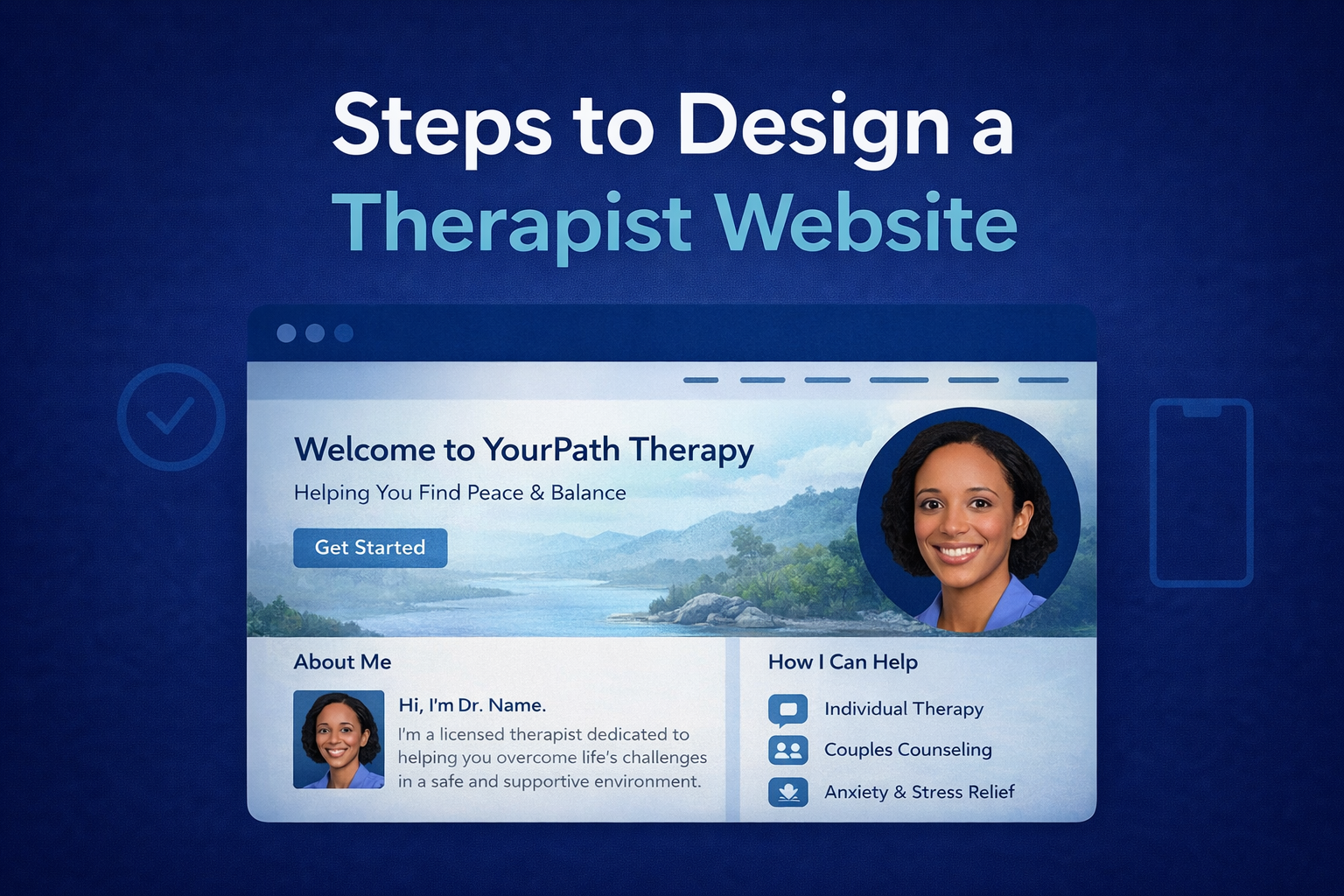As artificial intelligence (AI) and voice search technologies reshape how clients find mental health services, optimizing therapist directories for local AI search queries has become essential for mental health professionals. By aligning with local search trends and AI-driven algorithms, therapist directories can improve visibility, attract relevant clients, and enhance user experience.
Why Optimize Therapist Directories for Local AI Search Queries?
Therapist directories, such as Psychology Today or TherapyTribe, are critical tools for connecting clients with mental health professionals. With the rise of AI-powered search tools and voice assistants (e.g., Google Assistant, Siri), clients increasingly use conversational, location-specific queries like “therapist near me for anxiety” or “counselor in [city] who speaks Spanish.” Optimizing directories for these queries ensures:
- Increased Visibility: Rank higher in local search results, capturing clients actively seeking services.
- Targeted Client Reach: Attract clients in your geographic area with specific needs.
- Enhanced User Experience: Provide clear, accessible information that aligns with AI search intent.
- Competitive Edge: Stand out in crowded directories by leveraging AI-driven SEO trends.
This guide provides actionable strategies to optimize therapist directories for local AI search queries, ensuring compliance and client trust.
Understanding Local AI Search Queries
AI search queries, particularly those via voice assistants, differ from traditional text searches. They are:
- Conversational: Users ask full questions, e.g., “Where can I find a therapist in Seattle for depression?”
- Location-Specific: Local intent is critical, with terms like “near me” or city names.
- Intent-Driven: Clients seek quick, relevant answers, often expecting immediate contact options or service details.
Optimizing for these queries requires aligning directory profiles with AI algorithms, which prioritize relevance, proximity, and user-friendly content.
Strategies for Optimizing Therapist Directories
1. Enhance Local SEO with Accurate Business Information
Local SEO is the foundation of AI search optimization. Ensure your directory profile includes:
- Complete NAP Details: Name, Address, and Phone Number (NAP) should be consistent across all directories and your practice website.
- Geographic Keywords: Include city, neighborhood, or region names in your profile description, e.g., “Seattle therapist specializing in anxiety.”
- Google Business Profile Integration: Link your directory profile to a verified Google Business Profile to boost local ranking signals.
For more on local SEO, see local SEO for mental health practices.
2. Optimize for Conversational Keywords
AI searches rely on natural language processing, so your directory profile must target conversational phrases. Best practices include:
- Use Long-Tail Keywords: Incorporate phrases like “therapist for PTSD in [city]” or “bilingual counselor near me.”
- Answer Common Questions: Include FAQs in your profile, such as “What is cognitive behavioral therapy?” or “Do you offer teletherapy in [state]?”
- Structure for Featured Snippets: Use concise, direct answers to common queries to rank in AI-driven “position zero” results.
For voice search optimization, explore voice search SEO for mental health.
3. Highlight Specializations and Services
AI searches often include specific client needs, such as therapy type or demographic focus. Optimize your profile by:
- Detailing Specializations: Clearly list areas like anxiety, depression, trauma, or couples therapy.
- Including Demographic Focus: Mention if you serve specific groups, e.g., “LGBTQ+ therapist” or “child psychologist.”
- Adding Language Options: Note multilingual capabilities, e.g., “Spanish-speaking therapist in [city].”
This ensures your profile matches niche AI queries, increasing relevance.
4. Incorporate Schema Markup
Schema markup helps AI algorithms understand your directory profile’s content. Key steps include:
- Use LocalBusiness Schema: Add structured data for your practice’s name, address, phone, and services.
- Include FAQ Schema: Mark up FAQs to improve chances of appearing in voice search answers.
- Apply Therapist-Specific Schema: Use schema for healthcare providers to highlight credentials and specialties.
5. Ensure Mobile-Friendly and Accessible Design
Many AI searches occur on mobile devices, so directory profiles must be mobile-optimized and accessible. Best practices include:
- Responsive Design: Ensure your profile displays well on smartphones and tablets.
- Fast Load Times: Optimize images and reduce clutter to improve loading speed.
- Accessibility Features: Use clear fonts, high-contrast text, and alt text for images to support clients with disabilities.
For more, see mobile-friendly websites for psychologists.
6. Leverage Client Reviews and Testimonials
AI algorithms prioritize profiles with strong authority signals, such as reviews. Steps include:
- Encourage Reviews: Ask satisfied clients to leave reviews on your directory profile, emphasizing local relevance (e.g., “Great therapist in [city]!”).
- Respond to Reviews: Engage with reviews professionally to demonstrate responsiveness and build trust.
- Highlight Testimonials: Include anonymized, HIPAA-compliant testimonials that showcase your expertise.
7. Integrate with Practice Website and Teletherapy Tools
Linking your directory profile to a robust practice website enhances credibility and functionality. Ensure:
- Consistent Branding: Align your directory profile with your website’s design and messaging.
- HIPAA-Compliant Forms: Link to secure intake or consent forms for seamless client onboarding.
- Teletherapy Options: Highlight virtual session availability to capture clients searching for “online therapy in [city].”
For form guidance, check best online intake forms for therapy practices.
8. Monitor and Update Profiles Regularly
AI algorithms favor fresh, accurate content. Best practices include:
- Update Contact Information: Ensure NAP details remain consistent and current.
- Refresh Content: Add new services, specialties, or FAQs to reflect practice changes.
- Track Performance: Use analytics tools to monitor profile views, clicks, and search rankings, adjusting strategies as needed.
Benefits of Optimizing for Local AI Search Queries
- Increased Visibility: Rank higher in local AI and voice search results, capturing more client inquiries.
- Targeted Client Acquisition: Attract clients who match your specialties and location.
- Enhanced Client Trust: Professional, optimized profiles build confidence in your expertise.
- Improved Accessibility: Mobile-friendly, multilingual profiles reach diverse populations.
- Competitive Advantage: Stand out in crowded directories by aligning with AI trends.
Challenges and Solutions
Challenge: Keeping Profiles Consistent Across Directories
Solution: Use a centralized tool like Moz Local to manage NAP details across multiple platforms.
Challenge: Competing in Saturated Markets
Solution: Focus on niche keywords (e.g., “EMDR therapist in [city]”) and highlight unique qualifications to differentiate your profile.
Challenge: Limited Budget for Optimization
Solution: Prioritize free or low-cost strategies, such as updating Google Business Profile and using open-source schema tools.
Challenge: Ensuring HIPAA Compliance
Solution: Use HIPAA-compliant directory platforms and avoid sharing sensitive client data in public-facing profiles.
For compliance insights, see HIPAA-compliant tools for mental health counseling.
Ethical Considerations
- Data Privacy: Ensure directory profiles and linked websites comply with HIPAA to protect client information.
- Transparency: Clearly disclose services, credentials, and limitations to maintain trust.
- Cultural Sensitivity: Use inclusive language and offer multilingual options to respect diverse client needs.
- Accessibility: Design profiles to accommodate clients with disabilities, ensuring equitable access.
Tools and Platforms for Optimization
- Directory Platforms: Psychology Today, GoodTherapy, or Zocdoc with local SEO features.
- SEO Tools: SEMrush or Ahrefs for keyword research and performance tracking.
- Schema Generators: Schema.org or Google’s Structured Data Markup Helper.
- Analytics Tools: Google Analytics and Search Console to monitor search performance.
The Future of Therapist Directories and AI Search
Emerging trends will further shape directory optimization:
- Advanced AI Algorithms: More sophisticated natural language processing will prioritize hyper-local and intent-driven results.
- Voice-Activated Booking: Clients may book appointments directly via voice assistants linked to directories.
- Multilingual AI Support: AI will better handle multilingual queries, requiring directories to offer robust language options.
Staying ahead of these trends ensures long-term visibility and client engagement.
Conclusion
Optimizing therapist directories for local AI search queries is essential for attracting clients, enhancing accessibility, and staying competitive in 2025. By focusing on local SEO, conversational keywords, mobile optimization, and HIPAA compliance, therapists can create directory profiles that align with AI-driven search trends. Regular updates and ethical practices ensure these profiles build trust and deliver value to diverse client populations.
For expert assistance in optimizing therapist directories and other digital solutions, explore Mental Health IT Solutions.







